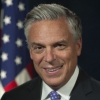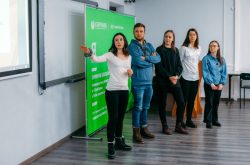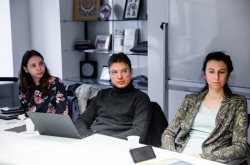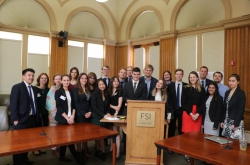About SURF
The Stanford US-Russia forum is an organization that brings together students from Russian and U.S. universities to help them participate in joint research. SURF’s main goals are: to encourage cooperation and dialogue between American and Russian students across many fields, including science, economy, politics, history, entrepreneurship, and others; and to promote ideas aimed at improving the US-Russia relations and contribute to the dialogue between political stakeholders, academics and experts.
As the program’s organizers note, participants from both sides spend almost a year working on their projects and conducting research that they later present to individuals and organizations which have a direct influence on the US-Russia dialogue.

Every year, several dozens of students and specialists of different kinds from Russia and the USA are chosen to participate in the program. This year, 29 individuals from both countries were selected, with almost 300 having participated in the program’s seven years of operation. A distinguishing feature of SURF is that its cohesive community of former participants shares its experience with the newcomers.
Having passed the selection, the students get to travel around Russia and the USA and collaborate with various specialists from fields relevant to their research. According to the program’s organizers, the experience of taking part in SURF helps establish firm relations within the professional community.
Taking part

Among this year’s participants was Daria Denisova, the deputy head of ITMO University’s Center for Science Communication. As she explains, all applicants have to pass a rigorous multi-stage selection process. Although the deadline for applications is usually in early June, applicants are advised not to delay and submit theirs in advance (you can apply to the program and stay up to date here).
Applicants submit a CV and several written essays about themselves and their research project. Those who pass the initial stages must also meet a special committee for an interview.
“I learned about the program a few years ago when I was sent to do an internship at UCLA by ITMO University. I wanted to apply back then, but missed the deadline; this year, I decided to finish what I started. I almost forgot about it when they got in touch with me in August and told me I’d need to do an interview. Due to the time difference, I had to be ready for the interview at 4:30 in the morning, smiling and well-dressed,” says Daria Denisova.

At first, participants work online: they have to decide which topics they prefer before October comes around, at which point they are split into groups according to their interests. Teams consist of both Russians and Americans; working together, they must not only get to know each other, but also start preparing data on their chosen topic and compile an initial 10-12 page research proposal.
Moscow, Tyumen, and Stanford
The program begins in fall, during a conference in Russia; two of its stages take place in Moscow and Tyumen. At the conference, delegates form groups in which they will develop their projects over the course of an academic year. After eight months, they will present their achievements in person during a conference at Stanford University.
At the conference in Russia, they get to meet and talk to government officials, businessmen, and scientists. For example, the participants of this year’s SURF went on an extensive diplomatic tour, paying visits to the Russian Ministry of Foreign Affairs, where they met Minister Sergey Lavrov, the Russian Federation Council, the U.S. Embassy in Moscow, where they met Ambassador Jon Huntsman Jr., Skoltech, offices of Boeing Russia and Sberbank.

In Tyumen, where the forum has hosted events for the past four years, they met the Governor of Tyumen Oblast Alexander Moor; they also visit the Tyumen State University’s School of Advanced Studies, a few large and small businesses, and even several Russian families.
“The first visit is, first and foremost, an opportunity for all participants to meet each other. There is also a densely-packed program: each day was scheduled from early morning till late evening,” says Daria Denisova “I think even the Russian participants were quite overwhelmed. When you’re there, you realize that you have the opportunity to talk to an actual Minister and discuss various political matters. Everyone asked questions related to their projects or other topics that they were personally interested in. Even the fact that 29 people from the USA and Russia can come together to places such as this and talk directly is very important.”
Project work
Daria Denisova will work on her SURF project together with Julia Milton, a PhD student at MIT who specializes in aeronautics and astronautics research. Their project concerns the current-day Russia-US partnership in space exploration.

“Many participants were sorted into teams and given unexpected topics to provide them a sort of a challenge. The topic of space was brought up when our team was joined by Julia Milton from MIT. It was, indeed, a challenge for me to tackle that topic. We plan to look at space science using the methods and tools of science communication. I think that’s quite an interesting idea. Besides, the topic of space, as the experts we spoke to in Moscow noted, is crucial in regard to the Russia-US relationship. It’s impossible to talk about space in the context of just one nation,” says Daria Denisova.
At this point, they have already analyzed various documents and regulations, as well as the press coverage of joint projects related to space exploration over the past year. However, the research will make an emphasis on interviews with experts, including scientists, decision makers, representatives of various organizations, and PR specialists. During the conference in Moscow, the researchers already managed to get in touch with the head of PR of the Museum of Cosmonautics.
The project will also include a visual element: Russian artist Anastasiia Prosochkina, whose works often revolve around the topic of space, is expected to collaborate. Daria Denisova has already given some of the artist’s works to the U.S. Ambassador to Russia Jon Huntsman Jr. during a meeting in Moscow.

Prospects
The participants work on their project online, but their colleagues from Russia and the USA are constantly in touch and keeping a close eye on the progress; the requirements are very high, explains Daria. They must present a draft version of their article by late December. All articles are reviewed by their peers from other teams, as well as mentors. Each team presents a report and a set of recommendations, all according to the rules of academic research.
By February, all teams must be able to present a complete research article, as well as a so-called “deliverable”: a visual project or document that will be presented during the final stage. Teams present their articles and deliverables at a conference in Stanford University in April. Those who complete their defense are presented a SURF Alumni certificate.

In the future, this project, says Daria, can serve as a foundation for research by students of the Master’s program in science communication.
“Our project can also exist as a successful case example of scientific diplomacy. In addition, SURF has a very close-knit community, and many former participants are helping out this year’s teams. I hope that next year we will, too, be able to contribute to projects by other newcomers,” she says.







